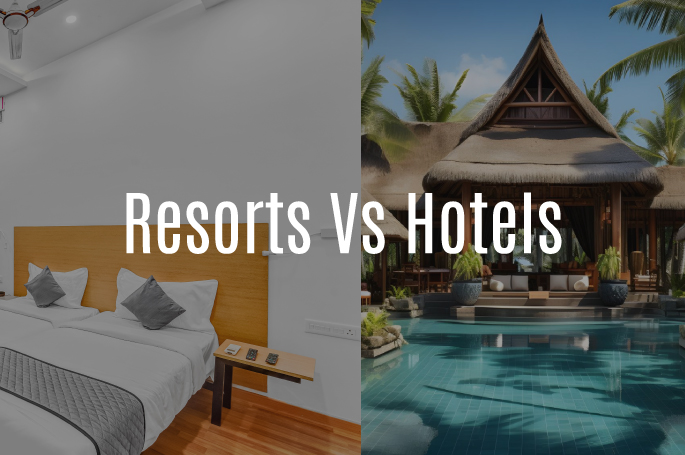Differences Between Hotels and Resorts: Resort Vs Hotel Differences
Choosing the right accommodation can make or break your travel experience. Whether you’re planning a quick city getaway or a relaxing retreat, understanding the difference between hotel and resort is crucial. Both offer unique experiences tailored to different needs, but which one truly aligns with your travel goals? In this blog, we will dive deep into what is a hotel and what is a resort, explore the key differences between hotels and resorts, and guide you on when to choose one over the other.
If you are seeking the perfect blend of comfort, luxury and convenience, then you might want to go for the top hotel choice; Upar Hotels! Located in various parts of Chennai city, Bangalore and Sukhumvit, Bangkok, Upar Hotels serves a diverse customer base with eclectic amenities and facilities.
What is a Hotel?
Wondering what is a hotel? A hotel is a commercial establishment that provides lodging, typically on a short-term basis, for travellers and tourists. Hotels vary widely in terms of size, style, and amenities, ranging from budget-friendly options to luxurious five-star accommodations. They are generally designed to offer essential services such as clean and comfortable rooms, daily housekeeping, room service, and often additional facilities like restaurants, fitness centres, and business centres. Hotels are usually located in urban areas, near transportation hubs, or business districts, making them ideal for both leisure and business travellers seeking convenience and accessibility. Their primary goal is to provide a comfortable and efficient stay, focusing on the needs of guests who are often on the move.
Also Read: 10 steps on how to book a hotel room online.
What is a Resort?
What is a resort hotel? A resort is a self-contained destination designed to offer a complete vacation experience within its premises. Resorts are typically situated in scenic or secluded locations, such as beaches, mountains, or countryside, and are equipped with a wide range of amenities and recreational facilities. Unlike hotels, resorts emphasise providing a comprehensive leisure experience, often featuring multiple dining options, entertainment venues, spas, golf courses, and organised activities. The goal of a resort is to keep guests entertained and comfortable without needing to leave the property, making them ideal for extended stays and vacations. Resorts cater to those looking for relaxation and enjoyment in a more immersive and expansive environment, where the focus is on creating a memorable and all-inclusive retreat.
What is the Difference Between Hotel and Resort?
1. Resort Vs Hotel: Amenities
One of the key aspects that highlight the difference between hotels and resorts is the range of amenities offered. Hotels typically focus on providing essential services such as comfortable rooms, room service, and basic recreational facilities like a gym or business centre. In contrast, resorts go beyond these basics, offering a comprehensive array of amenities including multiple dining options, spas, golf courses, and organised activities. Understanding the resort vs hotel amenities helps in determining the right choice based on your needs for relaxation and activities.
2. Resort and Hotel Difference in Location
The location plays a significant role in understanding resort and hotel differences. Hotels are often situated in urban areas or near transportation hubs, making them ideal for travellers seeking convenience and proximity to local attractions and business centres. Resorts, on the other hand, are typically found in more scenic or secluded areas like beaches, mountains, or countryside. The goal of a resort is to provide a getaway experience, where the setting itself contributes to overall relaxation and enjoyment whereas hotels create an environment for travellers to explore nearby attraction spots and come back to the home-like cosy hotel room.
3. Resort Vs Hotel: Length of Stay
The length of stay is one of the key differences between a hotel and resort that sets them apart from one another. Hotels are commonly chosen for short-term stays, catering to both business travellers and tourists who are often on the move. They provide the necessary amenities for a comfortable short visit. Conversely, resorts are designed for longer stays, encouraging guests to spend more time on-site and enjoy the full range of activities and services available. This what is the difference between hotel and resort in terms of stay duration reflects the intent of each type of accommodation, with resorts aiming to offer an extended and immersive experience.
4. Resort and Hotel Difference in Cost
Cost is a crucial element in understanding the hotel vs resort difference. Hotels generally offer a range of pricing options, from budget to luxury, making them suitable for various travel budgets. Resorts, due to their extensive amenities and all-inclusive nature, often come with a higher price tag. The resort vs hotel cost comparison highlights how resorts can be more expensive, reflecting the additional value provided by the numerous on-site features and activities and the diverse nature of hotels when it comes to pricing to suit the budget of every traveller. Knowing the resort and hotel difference in cost can help you budget appropriately and choose the option that best fits your travel plans.
Types of Hotels
1. Budget Hotels: Budget hotels provide basic accommodations at an affordable price, focusing on essential amenities like clean rooms and comfortable beds without extra frills. They are ideal for travellers seeking economical options for short stays.
However, there are some budget hotels providing luxurious amenities and facilities for the comfort of the guests like Upar Hotels. Check out the different types of rooms available in your desired location and book a room for yourself now!
2. Luxury Hotels: Luxury hotels offer high-end services and opulent amenities, including fine dining, spas, and personalised services. They cater to guests looking for a premium, pampered experience with exceptional comfort and attention to detail.
3. Boutique Hotels: Boutique hotels are small, stylish properties with a unique character and personalised service. They often feature distinctive decor and cater to travellers seeking a more intimate and memorable stay.
4. Business Hotels: Business hotels are designed to accommodate corporate travellers with amenities such as meeting rooms, high-speed internet and comfortable work desks. They focus on providing a convenient and productive environment for work-related stays.
5. Chain Hotels: Chain hotels are part of a larger network of properties under a single brand, offering standardised services and amenities. They provide consistency in quality and comfort, making them a reliable choice for travellers familiar with the brand.
6. Extended Stay Hotels: Extended stay hotels cater to guests who need lodging for longer periods, offering amenities like a mini bar, luggage storage and laundry facilities. They are ideal for business travellers or those relocating temporarily and require home-like conveniences.
7. Star Hotels: Star hotels are classified based on their quality and service level, ranging from one to five stars. Each star rating reflects the hotel's range of amenities, service standards, and overall guest experience.
Read more on this in our blog on “20 Different Types of Hotel Rooms for an Unforgettable Stay”.
Types of Resorts
1. All-Inclusive Resorts: All-inclusive resorts offer a comprehensive vacation experience with accommodation, meals, drinks, and various activities all included in the price. This type of resort ensures guests can enjoy a worry-free stay with everything they need at their fingertips.
2. Beach Resorts: Beach resorts are located near the shoreline, providing easy access to sandy beaches and water activities like swimming and snorkelling. They are perfect for those seeking sun, sea, and relaxation in a coastal setting.
3. Wellness Resorts: Wellness resorts focus on health and rejuvenation, offering amenities such as spas, yoga classes, and nutritious dining options. These resorts are designed to provide guests with a holistic experience aimed at improving their physical and mental well-being.
4. Eco-Friendly Resorts: Eco-friendly resorts prioritise sustainability and environmental conservation, incorporating green practices like renewable energy, waste reduction, and eco-friendly building materials. They appeal to travellers who want to minimise their ecological footprint while enjoying nature.
5. Family Resorts: Family resorts are designed with the needs of families in mind, featuring kids’ friendly and family-friendly amenities, activities and spacious accommodations. They offer a range of activities that cater to all ages, ensuring an enjoyable vacation for the whole family.
When to Stay at a Hotel?
- Business Travel: If you're travelling for work, a hotel located near business centres or conference venues is ideal for convenience and efficiency.
- Short Stays: Hotels are perfect for quick trips, weekend getaways, or overnight stays where you need basic amenities and comfort.
- Sightseeing: Choose a hotel if you plan to explore a city, as they are often located in central areas with easy access to tourist attractions, shopping, and dining.
- Budget-Friendly Options: If you're looking for cost-effective accommodation, especially in city centres, budget or chain hotels can offer affordable rates without sacrificing comfort.
- Minimal Amenities Needed: When your focus is on exploring the destination rather than the accommodation itself, a hotel provides just the right amount of services without unnecessary extras.
Book a luxurious room at Upar Hotels at the best price!
When to Stay at a Resort?
- Extended Vacations: Resorts are ideal for longer stays where you want to relax and enjoy various on-site amenities without leaving the property.
- Leisure and Relaxation: If your primary goal is to unwind, a resort offers a range of recreational activities, spa services and entertainment to keep you entertained and stress-free.
- Destination Getaways: For trips focused on a particular setting, like beaches, mountains, or secluded areas, resorts provide an immersive experience with everything you need in one place.
- All-Inclusive Convenience: If you prefer a hassle-free vacation where everything is included, from meals to entertainment, staying at an all-inclusive resort ensures you have a worry-free experience.
Experience Comfort and Luxury at Upar Hotels
Discover the perfect blend of comfort and convenience at Upar Hotels, where budget-friendly stays meet exceptional amenities. With prime locations in Chennai, Bangalore, and Bangkok, Upar Hotels offers easy access to key areas while ensuring a relaxing and memorable experience. Whether you're in town for business or leisure, Upar Hotels is your ideal choice for a comfortable stay.
Love reading about travel and hospitality? Bing-read all our blogs!

